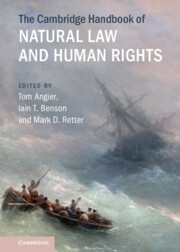Book contents
- The Cambridge Handbook of Natural Law and Human Rights
- The Cambridge Handbook of Natural Law and Human Rights
- Copyright page
- Contents
- Contributors
- Acknowledgements
- Introduction
- Part I Natural Law and the Origins of Human Rights
- Part II Natural Law Foundations of Human Rights Obligations
- 8 Ontological and Epistemological Foundations of Human Rights
- 9 The Teleological Foundations of Human Rights
- 10 New Natural Law Foundations of Human Rights
- 11 A Personalist Foundation for Natural Law and Human Rights
- 12 Acknowledged Dependence, Natural Right, and Human Rights
- 13 Eternal Law, Natural Law, Natural Rights
- Part III Natural Law and Human Rights within Religious Traditions
- Part IV The Human Person, Political Community, and Rule of Law
- Part V Rival Interpretations and Interpretive Principles
- Part VI Challenges and Future Prospects
- Index
13 - Eternal Law, Natural Law, Natural Rights
Freedom and Power in Aquinas
from Part II - Natural Law Foundations of Human Rights Obligations
Published online by Cambridge University Press: 03 November 2022
- The Cambridge Handbook of Natural Law and Human Rights
- The Cambridge Handbook of Natural Law and Human Rights
- Copyright page
- Contents
- Contributors
- Acknowledgements
- Introduction
- Part I Natural Law and the Origins of Human Rights
- Part II Natural Law Foundations of Human Rights Obligations
- 8 Ontological and Epistemological Foundations of Human Rights
- 9 The Teleological Foundations of Human Rights
- 10 New Natural Law Foundations of Human Rights
- 11 A Personalist Foundation for Natural Law and Human Rights
- 12 Acknowledged Dependence, Natural Right, and Human Rights
- 13 Eternal Law, Natural Law, Natural Rights
- Part III Natural Law and Human Rights within Religious Traditions
- Part IV The Human Person, Political Community, and Rule of Law
- Part V Rival Interpretations and Interpretive Principles
- Part VI Challenges and Future Prospects
- Index
Summary
This chapter argues that Aquinas’ conception of eternal law implies a particular way of understanding human freedom, reflected in his treatment of natural rights. To make this argument plausible, it is necessary to show that Aquinas does endorse some notion of subjective natural rights. While he does not have a theory of natural rights, he does have a working knowledge of the legal norms of his time, including practices of claiming and vindicating natural rights. He accepts, seemingly without question, that individuals can, under certain circumstances, claim something or resist the claim of another on the basis of a natural or divine jus, or right, including most notably a right to material necessities of life, and a right to make decisions for one’s young children. Importantly, these are not just asserted as objective duties; he defends the power of individuals to assert these rights without fear of punishment or coercion, even in cases in which one asserts a right to do something wrong. These aspects of Aquinas’ thought raise illuminating connections between the theological conception of eternal law and an account of natural rights, taking Aquinas’ remarks as a starting point.
- Type
- Chapter
- Information
- The Cambridge Handbook of Natural Law and Human Rights , pp. 190 - 202Publisher: Cambridge University PressPrint publication year: 2022



